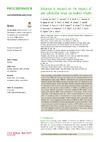Please use this identifier to cite or link to this item:
https://accedacris.ulpgc.es/jspui/handle/10553/55128
| Title: | Advances in research on the impacts of anti-submarine sonar on beaked whales | Authors: | Bernaldo De Quirós, Y. Fernández Rodríguez, Antonio Jesús Baird, R. W. Brownell, R. L. Aguilar De Soto, N. Allen, D. Arbelo, M. Arregui Gil, Marina Costidis, A. Fahlman, A. Frantzis, A. Gulland, F. M.D. Iñíguez, M. Johnson, M. Komnenou, A. Koopman, H. Pabst, D. A. Roe, W. D. Sierra, E. Tejedor, M. Schorr, G. |
UNESCO Clasification: | 3109 Ciencias veterinarias | Keywords: | Beaked Whales Sonar Stranding Decompression Sickness Naval Exercises |
Issue Date: | 2019 | Publisher: | 0962-8452 | Project: | Patologia Embolica (Gaseosa/Grasa) en Cetaceos (Pegcet-3) Red Macaronésica de transferencia de conocimientos y tecnologías interregional y multidisciplinar para proteger, vigilar y monitorizar los cetáceos y el medio marino, y analizar y explotar de forma sostenible la actividad turística asociada |
Journal: | Proceedings of the Royal Society B: Biological Sciences | Abstract: | Mass stranding events (MSEs) of beaked whales (BWs) were extremely rare prior to the 1960s but increased markedly after the development of naval mid-frequency active sonar (MFAS). The temporal and spatial associations between atypical BW MSEs and naval exercises were first observed in the Canary Islands, Spain, in the mid-1980s. Further research on BWs stranded in association with naval exercises demonstrated pathological findings consistent with decompression sickness (DCS). A 2004 ban on MFASs around the Canary Islands successfully prevented additional BW MSEs in the region, but atypical MSEs have continued in other places of the world, especially in the Mediterranean Sea, with examined individuals showing DCS. A workshop held in Fuerteventura, Canary Islands, in September 2017 reviewed current knowledge on BW atypical MSEs associated with MFAS. Our review suggests that the effects of MFAS on BWs vary among individuals or populations, and predisposing factors may contribute to individual outcomes. Spatial management specific to BW habitat, such as the MFAS ban in the Canary Islands, has proven to be an effective mitigation tool and mitigation measures should be established in other areas taking into consideration known population-level information. | URI: | https://accedacris.ulpgc.es/handle/10553/55128 | ISSN: | 0962-8452 | DOI: | 10.1098/rspb.2018.2533 | Source: | Proceedings of the Royal Society B: Biological Sciences[ISSN 0962-8452],v. 286 (1895) |
| Appears in Collections: | Artículos |
SCOPUSTM
Citations
86
checked on Jun 8, 2025
WEB OF SCIENCETM
Citations
76
checked on Jan 25, 2026
Page view(s)
82
checked on Jan 11, 2026
Download(s)
38
checked on Jan 11, 2026
Google ScholarTM
Check
Altmetric
Share
Export metadata
Items in accedaCRIS are protected by copyright, with all rights reserved, unless otherwise indicated.
